Search Results
Search
Filter results
Advanced Filters
Your search returned 69 Solutions
-
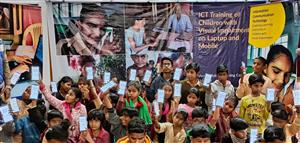
A concerted effort for the usage of accessible ICT devices supporting children with disabilities in low-income contexts
Sightsavers India, a national NGO, promotes inclusive education with accessible ICT devices in remote areas. In 2022, it supported over 6,000 visually impaired learners across mainstream primary and secondary schools.
Eight-State Inclusive Education Programme, India -
A free online ICT accessibility course, accessible by the blind and deaf
The ICT Accessibility Open Online Course (MOOC) is a six-week, 100-hour course taught by accessibility experts. The self-paced format encourages interaction between students and instructors. The project was initiated in 2016 and by 2017 7,636 enrollments from 169 countries had been received.
AMAC - Accessibility Solutions & Research Center, ICT Accessibility MOOC Education for All, United States of America -
Adding universal design in ICT student curricula
The project uses active learning approaches to ensure that all students studying technology gain knowledge on the universal design of ICT. Active learning involves student-centred teaching methods and adaptive and individualized support. At the graduate level universal design is a requirement for all technology students
Oslo and Akershus University, Norway -
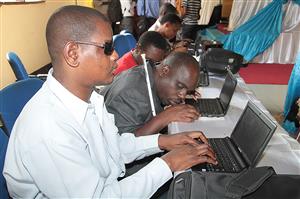
Using computers to support blind learners on all levels of education
The objective of the project is to integrate assistive technology in the national education system, and thus ensure that assistive technology for people with visual impairment is available at the workplace and at all levels of education. Representatives from the identified proposed project areas were thoroughly involved in the planning process.
Tanzania League of the Blind, Tanzania -
A national effort to promote employment in the ICT sector
The programme equips people with various disabilities with the skills required for work in the ICT sector, and places them in appropriate companies. Launched in 2013, it has trained 467 people by 2016. 83% of them (one third women) are employed full-time in 16 companies and are paid entirely by their employers.
MCIT - Egypt Ministry of Communications and Information Technology, Employment Opportunities for Persons with Disabilities Programme of 2013 Ministry of Communications and Information Technology (MCIT), in cooperation with Misr El Kheir Foundation (MEK), Chamber of Communications and Information Technology (CIT) and Daesn, Egypt, Egypt -
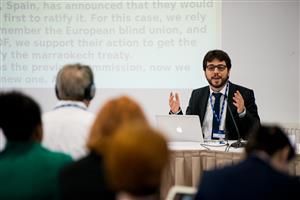
Transatlantic e-Accessibility standards cooperation
In 2004 the United States and the European Union initiated a process to harmonize the standardisation of ICT accessibility requirements. This cooperation resulted in largely compatible standards, that can create enormous leverage for accessible technologies and possibly lay the groundwork for an international standard.
United States Access Board, Mandate 376; European Standard on e-Accessibility EN 301 549 of 2014 of the European Commission, European Union Proposed rule for 508 Standards and the 255 Guidelines of 2015 of the U.S. Access Board, USA, United States of America -
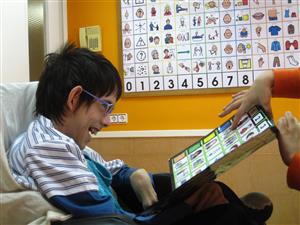
#ASPACEnet improves the autonomy and social interaction of people with cerebral palsy through the development and deployment of innovative technological solutions and by undertaking the necessary adjustments to computers, phones and tablets.
#ASPACEnet was launched in 2011 as a project which joins ICT and persons with cerebral palsy via information and support. Beneficiaries are informed about existing products and services and receive training in the care centres. By 2013 more than 1,200 persons, 600 with cerebral palsy, had benefited from the innovations.
ASPACE Confederacion, Using ICT to empower persons with cerebral palsy, Spain -
Harmonization of ICT standards across the Atlantic
In 2004 the international standards cooperation was initiated to create a framework for developing a wide range of applications that will make ICT products and services more accessible in both continents. Moreover, it facilitates trade between these regions. By 2017, 90% of all standards have been harmonized.
United States Access Board, United States – European Union – U.S. Access Board & European Commission – International e-Accessibility Standards, United States of America -
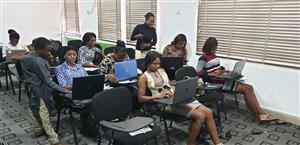
Comprehensive ICT skills empowerment programme for disadvantaged women and girls in sub-Saharan Africa
Save Our Needy Organization (SON), Nigeria: Empowers underprivileged girls and women, focusing on digital, entrepreneurship, and leadership skills. In 2023, expanded to reach over 2,000 females in six Nigerian regions.
Project Empower, Nigeria -
Creating smart accessible media using RoboBraille
RoboBraille is a free, award-winning service, capable of automatically converting documents into alternate formats. The goal of the project is to explore new smarter and easier methods to prepare and produce educational material in alternate formats using RoboBraille and other relevant free ICT tools.
Hilfsgemeinschaft - Austrian Association supporting the Blind and Visually Impaired, Austria